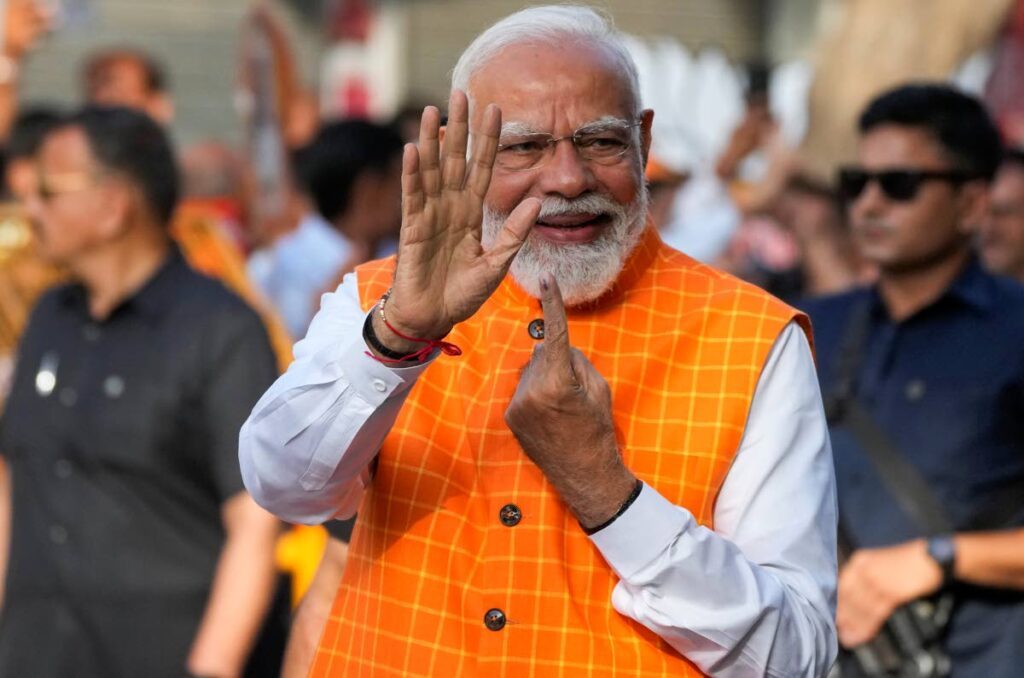The elections in India

TREVOR SUDAMA
I WRITE with a sense of discomfort, unease and disappointment after reading a report in the Newsday of April 8 which stated, among other things, that “Prime Minister Narendra Modi mounted an increasingly shrill election campaign, ramping up polarising rhetoric in incendiary speeches that have targeted the Muslim minority...Modi has called Muslims ‘infiltrators’ and said that they have too many children...with the aim of outnumbering Hindus in India.”
The rival Indian National Congress Party is accused of “scheming to ‘loot’ wealth from the country’s Hindus and redistribute it among Muslims” including women’s wealth in the form of their "mangal sutra" to be given to selected voters, especially Muslims.
If the report is true, then it points to a number of disturbing developments in the politics of the country. Most polls have projected that Modi’s Bharatya Janata Party (BJP) will win a comfortable majority in the current elections. One wonders, therefore, about the reasons behind the vitriolic nature of the attack on Muslims.
Is it intended to further galvanise the support of Hindu nationalists who comprise the vast majority of BJP’s voters and whose enthusiasm may be seen to be flagging?
Is the rhetoric designed to distract attention from existing pressing problems in the socio-economic environment, such as steeply rising cost of living, galloping inequality, increasing levels of unemployment among youth and other sectors of the population, solidification of caste barriers, corruption and favouritism, rising resistance to autocratic rule and the abuse of state power?
Or is it retribution today for the historical repression of Hindus and Hinduism during the centuries of Mogul and Muslim rule in India?
If Modi characterises Muslims as "infiltrators" in India, then is he suggesting that they came in surreptitiously, do not belong and should be expelled forcibly or otherwise? Is there an insinuation of ethnic cleansing?
Do Muslims possess valid citizenship of India and as such have the right to have as many children as they desire? Should their rights be restricted in pursuit of a legitimate larger national purpose which, if not defined, is an arbitrary and unconstitutional exercise of power?
Little should be said about the crude and comedic claims of the alleged redistribution pledges of the Congress Party. After all, the Congress opposition has to rely primarily on Hindu votes to challenge for electoral supremacy.
History has shown that aggressive, irresponsible and resolute leaders seeking greater power and ultimate control have used incendiary language against minorities to bolster their own political support and power, or to use them as scapegoats for the difficulties and endemic problems faced by a country.
With varying degrees of intensity and disastrous outcomes, such attacks have been seen in many countries, such as Germany in the 1930s, Africa in the latter half of the 20th century and continuing, many eastern European states and currently in the US.
The essence of democracy is firstly the acknowledgement of legitimate differences between groups based on values, beliefs, perspectives, histories and forms of socialisation, and their capacity to lawfully express these differences.
Secondly, a democracy seeks to establish institutions, processes and platforms of public discourse to reconcile differences, promote compromise and facilitate inclusion of all in the national agenda. It is a high bar to scale and many democracies including the US are faltering in meeting these demanding standards.
India is looked upon by many countries as resolutely aspiring to become a fully functional democracy. In this context, some of the actions and statements of Modi and the BJP government may be seen as reneging on that aspiration. Democracy is not chracterised simply by the opportunity to cast a vote periodically or by the written provisions of a constitution.
The other fundamental point of reference which bears on the attitude towards and the relationship with minorities is the basic tenets of Hinduism. It is one of the great religions of the world and is generally defined by its doctrine of tolerance, eschewal of violence, acceptance of the diversity of beliefs and perspectives, inclusivity and the embrace of all.
One of the verses of the Ramayan states: “Seeya Ram Mai Sab Jag Jani, Karayo Pranaam Jorr Jag Pani.” It translates to: “I recognise God in all things in the world and pay my respects and reverence to all with clasped hands.”
Although espousing profound adherence to Hinduism, the question arises whether the leadership of the BJP is committed to the core principles of the religion as was its greatest practical exponent – the Karam Yogi, Mahatma Gandhi. However, Gandhi is not viewed by the BJP as the champion of the Hindu cause and the protector of its followers.

Comments
"The elections in India"